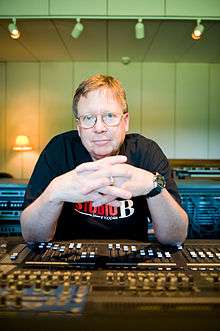Lane Gibson
| Lane Gibson | |
|---|---|
 Lane Gibson at His Recording Studio in Charlotte, Vermont June 25, 2009 | |
| Background information | |
| Birth name | Lane Gibson |
| Born |
June 21, 1950 New Jersey, United States |
| Occupation(s) | Recording engineer, musician |
| Instruments | Guitar, keyboards |
| Years active | 1980–present |
| Website | www.lanegibson.com |
| Notable instruments | |
| Guitar, keyboards, vocals | |
Lane Gibson is an American musician and recording engineer from Metuchen, NJ. His musical career spans over 40 years and since the 1990s, has also led to a career in sound engineering and mastering. From his recording studio in Charlotte, VT, Gibson has had the chance to work with many world-renowned artists and bands.
The beginning
In 1963, the British band the Beatles appeared on The Ed Sullivan Show and some would say, changed the face of pop music forever. The Beatles went on to achieve enormous success and inspire many young Americans to fall in love with music and begin learning to play musical instruments. Lane Gibson was one of those young Americans. Lane had been learning to play the guitar already, but the Beatles caused him to change the way he thought about music. He would no longer think about music as a hobby, but instead as a dream career.
Lane completed high school, and went on to attend the University of Denver in Denver, CO. While in Colorado, Lane and some like minded musicians (cousins) formed the Davis Brothers Garage Band. The band played covers of popular songs from the time including material from Elton John, Steely Dan, Emerson, Lake and Palmer, and Carlos Santana. As the band grew and matured they also began writing and performing their own songs as they toured, mostly in the Rocky Mountain West, but then later, all over New England.
The peak of Gibson's career with the Davis Brothers Garage Band came with the band signed a recording contract with the famous Charisma Records label from England. They recorded their hit single, "Lookin' For The Money" with the B Side, "If I Need Anybody". The song met with some commercial success, but the band ended up doing far more live performing than studio recorded ones. The band played some reunion shows as recently as the year 2006, but the band effectively broke up in 1982. Around the time the group disbanded, a career change was brewing for Gibson.
Recording and Mastering
During the years Lane Gibson was touring and playing in the western United States, and into his early years in Vermont, he supplemented that career by spending plenty of time in the recording studio. Whether it was laying down keyboard tracks or singing vocals, he noticed early on that he had an ear for helping musicians create clean balanced recordings. As early as 1980, Gibson was learning about and practicing studio recording. In 1993, Lane was working on some backup vocals for a studio session in Vermont, and he met Charles Eller, of Charles Eller Studios. The two hit it off, and Eller asked Gibson to come aboard as a sound engineer. The duo began a professional partnership that persists today, and in the words of Eller, they have, "been going strong ever since and make up an extremely strong team".[1]
As Gibson gained experience and created a reputation for clean, artful sound engineering in Vermont, he started working with big name artists from across the country. Some of the more well known artists to work with Gibson are: The Vermont Symphony Orchestra, The Vermont Jazz Ensemble, Trey Anastasio, Jon Fishman, Grace Potter and the Nocturnals, Kento Masuda, and Elizabeth Von Trapp. In 2009, Gibson assumed control of the Carpenter Farm Studio in Charlotte, Vermont and officially founded Lane Gibson Recording and Mastering. The Carpenter Farm building is a classic Vermont farmhouse with one big difference...the house has a custom designed recording studio attached to it. From the foundation to the finishing touches, the studio itself was designed for the purpose of creating and recording music. From double walls, windows and doors to soundproofing, the Carpenter Farm is now Lane Gibson's recording studio, and was described by the API industry blog as being, "made up of spacious yet intimate rooms to enable smooth workflow".[2] Gibson finds the natural beauty of the state, as well as the lack of background interference to be crucial to the success of his clients.
Discography
| Title | Label | Date |
|---|---|---|
| Lookin' for the Money | Charisma Records | 1979 |
Selected recording, mixing and mastering credits
| Artist | Title | Credit |
|---|---|---|
| Grace Potter and the Nocturnals | Original Soul | Recording, Mixing, Mastering |
| Grace Potter and the Nocturnals | Nothing But The Water | Recording, Mixing |
| Elisabeth von Trapp | One Heart, One Mind | Recording, Mixing, Mastering |
| Elisabeth von Trapp | Poetic License | Recording, Mixing, Mastering |
| Elisabeth von Trapp | Christmas Song | Recording, Mixing, Mastering |
| Elisabeth von Trapp | Love Never Ends | Recording, Mixing, Mastering |
| Putumayo World Music | Multiple Albums | Mastering |
| Cumbancha World Music | Multiple Albums | Mixing, Mastering |
| Kilimanjaro | Homecoming | Mixing Consultant, Additional Mastering |
| Anais Mitchell | The Brightness | Mastering |
Background Information
| Birth Name | Lane Gibson |
| Born | June 21, 1950 Albany, NY |
| Genres | Pop / Rock |
| Occupations | Musician, songwriter, producer, Sound Engineer |
| Instruments | Guitars, Keyboard, Vocals |
| Years active | 1970s – Present |
References
- ↑ Eller, Charles. "About Lane Gibson", Charles Eller Studios, August 22, 2006, accessed June 12, 2011.
- ↑ Word on the Street. "Lane Gibson Recording and Mastering", Word on the Street, April 10, 2010, accessed June 13, 2011.